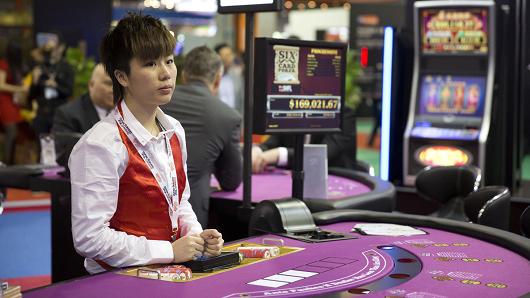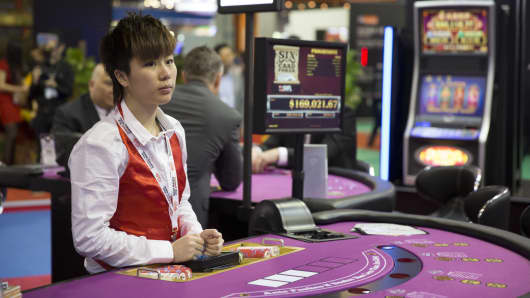

U.S. casino stocks were under pressure Monday after a miss in Macau’s June gaming growth and cautious comments from analysts about the outlook for the second half.
U.S. casino stocks were under pressure Monday after a miss in Macau’s June gaming growth and cautious comments from analysts about the outlook for the second half.
In early trading, Wynn Resorts was down 2.3 percent and Las Vegas Sands was down about 1.5 percent while MGM Resorts slipped as much as 1 percent but pared earlier losses. Shares of MGM fell 8 percent last week due to investor concerns about its near-term outlook and loss of market share in Macau.
Macau’s June gross gaming revenues was up 25.9 percent. However, a rise of 26.8 percent was expected, according to the average of analysts’ estimates compiled by Consensus Metrix. Estimates ranged from 23 percent to 33 percent growth for June compared with a year ago.
Union Gaming analyst Grant Govertsen linked the miss to a late June slowdown and added in a research note that the visit to Hong Kong by Chinese President Xi Jinping may have made business tougher since there was “a state of virtual lockdown over the last several days and this likely had the effect of curtailing high-end visitation to Macau during this period.”
Similarly, Nomura analyst Harry Curtis said in a note Monday that daily gaming revenues “decelerated meaningfully toward the end of June,” and he cited the visit “pressuring visitation.” He also sees a tougher second half for Macau and believes growth in gross gaming revenues will decelerate from the pace of the first half given tougher year-earlier comparisons and no new resort openings until MGM Cotai in the fourth quarter.
The Chinese leader arrived in Hong Kong on Thursday, and on his final day visited the construction site for a multibillion-dollar bridge that will reduce the travel time from Hong Kong to Macau from around three hours to about 30 minutes. The bridge’s opening later this year could make Macau’s tourism and convention business more attractive, including giving the hotel-casino operators more mid-week hotel stays.
Despite the miss, June represented the 11th-straight increase in year-over-year monthly gaming growth, and the 25.9 percent pace was the best since February 2014, when Macau’s growth exceeded 40 percent. By comparison, May 2017 produced monthly gross gaming revenue growth of 23.7 percent compared with a year ago.
To be clear, monthly comparisons with June 2016 were particularly easy given Macau was still reeling from Beijing’s corruption crackdown on junkets for high-value Chinese VIP gamblers.
Vitaly Umansky, a Sanford C. Bernstein analyst, agreed that the “Macau GGR came in disappointing.” In a research note Monday, he said the firm’s weekly channel checks during the first few weeks in June “had been too high and we continue to caution placing reliance on weekly GGR data.”
He added: “High hold rates in VIP along with the continued volume strength creates volatility and lack of ability to more accurately forecast the monthly trend.”
Indeed, Umansky had indicated last week in an interview that the VIP segment of the market was “so difficult to try to predict. The [casino] operators themselves kind of don’t know what will happen.”
For July, there’s a possibility the Macau gaming market could still feel impact from the visit of China’s president.
“We expect July to start rather slow due to Xi Jinping’s visit to Hong Kong,” said Govertsen. He believes it likely impacted the recent weekend business, pointing out that weekends are typically more meaningful in terms of gaming than mid-week trends.
As of Friday, analysts were looking for Macau’s July monthly GGR to increase 18.1 percent, according to Consensus Metrix.
